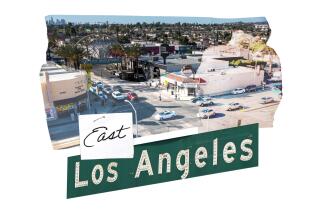Sewers and Cityhood in Malibu: It Could Be a Lengthy Fight
- Share via
After 18 months of intense lobbying, numerous court fights and dozens of delaying tactics, Malibu cityhood backers realize that playing politics with Los Angeles County officials can be a full contact sport.
And despite their elation over the unanimous approval of Malibu’s incorporation petition by the Local Agency Formation Commission last
week, campaign leaders acknowledge that the bruising battle to turn the beachfront community into the county’s 87th city is just beginning.
After a 30-day period in which incorporation opponents can ask LAFCO to reconsider its vote, it will be left to the County Board of Supervisors to set an election date for the measure.
Cityhood leaders maintain publicly that they will continue to push for a November election, which would require supervisors to set the election by Aug. 11. Privately, they admit that they stand little chance of casting a ballot before April, 1990.
“I think we would stand a better chance of building our own space shuttle and launching it from the Malibu Pier,” said one ardent cityhood backer.
Sewer System an Issue
The reasons are simple. Supervisors, after two decades of trying, recently approved a $43-million sewer system for Malibu over the objections of more than 1,000 residents and cityhood proponents. And two supervisors, while serving on LAFCO, led the fight to delay cityhood indefinitely, seeking a condition by LAFCO that would have kept the sewer system under county control for 10 years after Malibu incorporates.
Several county officials have testified that they are trying to remove any obstacles to building a sewer in Malibu. They note that since the cityhood movement sprang out of opposition to the county’s plan to build a regional sewer along the coast, cityhood remains the leading obstacle to the proposed sewer. Malibu leaders, upset about the cost of the proposed sewer, believe that its construction would lead to widespread development in the rural coastal community.
According to Tom Tidemanson, director of the county Department of Public Works, if Malibu incorporates before the system is built, it will “raise the possibility, even the probability, that it will be able to frustrate indefinitely the implementation of any sewer project.”
Cityhood supporters say they are frustrated with the numerous delays they have faced from the county in getting the issue before the board. But they can expect more: Supervisors have up to 190 days to place the measure on the ballot.
“I would expect that there will be forces at work (on the board) to move this thing forward, and there will be forces at work to delay it,” said Supervisor Ed Edelman, a cityhood supporter. “But I honestly don’t know what will happen.”
Maximum Time Allowed
Last year, after LAFCO approved Malibu’s cityhood proposal for the second time, county supervisors used the maximum amount of time allowed by law to set a hearing on the matter. Ultimately, LAFCO’s approval was rescinded after a developer filed a lawsuit contending that an environmental impact report was needed to determine the effects of a new city. It delayed the incorporation proceedings an additional seven months.
The long and divisive cityhood drive has taken its toll on campaign leaders. Recently, the Malibu Committee for Incorporation removed two of its board members and a third resigned in protest over the shake-up.
The departure of Mike Caggiano, Jim Armstead and Sy Sudar, considered three of the more moderate members on the committee, means that since the incorporation drive began in late 1987, committee co-chairs Walt Keller and Carolyn Van Horn are the only remaining members.
Keller said Caggiano was removed over “personal and philosophical differences” with the committee leaders. Keller said Caggiano’s decision to join a group that is planning ways to bring the proposed sewer under local control “was not consistent” with the committee’s sole purpose of placing the cityhood issue on the ballot. Armstead was removed because of repeated absenteeism, according to committee officials. Sudar said he resigned over the group’s treatment of Caggiano.
“There’s been some people in the group with different agendas,” Keller said.
However, critics of the incorporation campaign say that the group has become more closed, purging dissenters at a time when it needs to open its ranks to other views. Many Malibu residents, who view cityhood proponents as strident no-growth advocates, agree with the county that a sewer system is needed in Malibu to offset landslide problems caused by excess water in hillside areas and to clean up failing septic tanks in beachfront homes.
“When you refuse to listen to people that disagree with you, then you find yourself on a long road that leads nowhere,” said John Sibert, a community leader. “In the long run, I think that kind of action will be divisive. When you start removing people like that, there’s no one left to mention the fact that the emperor may be slightly undressed.”
Caggiano said the dissension in the group was generated by his belief “that you can work in the system and simultaneously try and change it. But there’s a view held by some people in this town that if you get involved in the process, you sanctify it.”
He said he would continue to fight for cityhood and was optimistic that the incorporation advocates could persuade supervisors to set a November election.
“I’m optimistic that we’ll make it,” Caggiano said. “But of course, I’m still waiting for Barry Minkow to do my carpets.”
More to Read
Sign up for Essential California
The most important California stories and recommendations in your inbox every morning.
You may occasionally receive promotional content from the Los Angeles Times.













